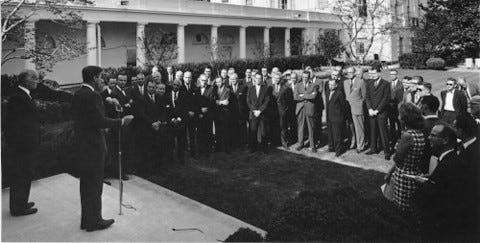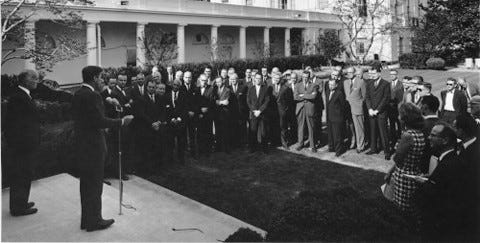When President John F. Kennedy created the U.S Agency for International Development (USAID)
Has The U.S. Just Gave Up Its Most Powerful Tool?

Audio Description: Sound recording of President John F. Kennedy’s remarks in the White House Rose Garden to a group of overseas mission directors of the Agency of International Development. Public Domain
On June 8, 1962, in the Rose Garden of the White House, President John F. Kennedy addressed the directors of the newly established U.S. Agency for International Development (USAID). His words did more than mark a policy announcement; they set the course of American foreign engagement for decades to come.
His message was clear: foreign aid was not charity—it was strategy. While he acknowledged that such programs were often unpopular at home, Kennedy made a compelling case: foreign aid carried a cost, but the absence of such programs could lead to far greater challenges —economic collapse, social unrest, and the spread of totalitarianism. The cost of foreign aid, he argued, paled in comparison to the consequences of its absence: economic collapse, social unrest, and the spread of totalitarianism.
"People who are opposed to aid should realize that this is a very powerful source of strength... to exert influence for the maintenance of freedom," he stated.
Kennedy understood a fundamental truth: economic desperation breeds instability, and instability invites oppression. Aiding developing nations was not merely a moral duty but a proactive investment in global security and American interests.
USAID was not an isolated effort —it was a continuation of Truman’s Marshall Plan, Eisenhower’s Cold War strategy, and a rare bipartisan consensus that saw international development as an essential pillar of national security.
Yet today, over six decades later, that vision has come to an abrupt halt. The U.S. State Department has suspended all foreign aid programs, save for emergency food assistance and military aid to Egypt and Israel. The decision is more than a policy shift—it is a retreat
The decision is more than a policy shift—it is a retreat. Where the U.S. withdraws, others step forward. China, with its Belt and Road Initiative, stands ready to fill the void, offering its own model of influence through infrastructure projects and economic partnerships. The balance of global power is shifting, and the implications will extend far beyond the diplomatic circles of Washington.
Kennedy once warned that the cost of inaction would always outweigh the cost of engagement. Now, that warning is being put to the test.
This article is free to read, but if you found it useful, please consider subscribing or making a small donation at my Buy Me A Coffee page below. The Climate Historian is an independent publication, entirely supported by readers like you.
Notes:
Special Message to the Congress on Foreign Aid. | The American Presidency Project
Remarks to a Group of Overseas Mission Directors of the Agency of International Development, 8 June 1962 https://www.jfklibrary.org/asset-viewer/archives/jfkwha-107-001
Executive Order 14169 - Wikipedia
Inside the Chaos of Trump's Foreign-Aid Freeze | TIME





Somewhat like an extension of the Marshal plan, to “Bookend” & contain Communism, the mission of Statecraft was ideological, not our selfish economic interests alone, but eventually realized thru trade-a 2 way street.